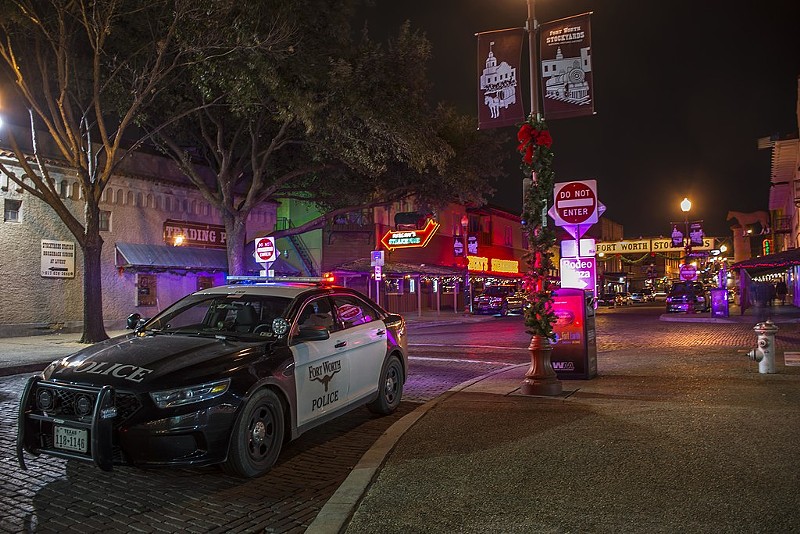The way the cops later told the story in their reports, they knocked on the door of a motel room, a man named Terry Yearling opened and then slammed the door shut. The officers heard him loading a weapon inside, they said, and ordered him to open up.
When he reopened the door, Yearling refused to cooperate, forcing the officers to tackle him. They arrested him and found a gun hidden beneath his mattress, the report said.
But this week, one of the officers, Jacob Hughes, turned himself in to the DeSoto Police Department on a warrant alleging that he had fabricated evidence.
The warrant had been issued after the Dallas Police Department reviewed the body camera footage from that day. What they saw revealed that the officers had actually opened the door with a key card, which amounts to an illegal search, the department says. A grand jury will now decide whether the five officers involved in the Motel 6 incident will be charged with official oppression.
Lawyer Toby Shook, who's representing Hughes, attributes the discrepancy to a simple mistake. But some local attorneys have doubts.
Shook said Hughes had to write his report the same day as the arrest, leaving him without a chance to review body camera footage. It was an unintentional error that might be subject to administrative action, but there was no criminal intent behind it, Shook said.
Attorneys Scott Palmer and James Roberts, who work at the Scott H. Palmer PC firm, have their doubts. They say they see fabrications of evidence by police in their cases all the time. “We read probable cause affidavits all day long, and they’re riddled with lies,” Palmer said.
In one of their cases, DPD officers claimed they were walking through a field in July 2018 when they saw Lee Yerena, who promptly told the cops he was a felon. “Just basically, ‘Hey, I’m a felon,’” Roberts explained.
But Palmer and Roberts got their hands on the body camera footage and learned the arrest played out much differently. All but one rookie police officer, Roberts said, had turned off their body cameras. Yerena was actually staying in a tent at a homeless encampment.
In the footage, the officers first approach a tent, Roberts said. "They sneak up and spray pepper spray into the tent without knowing who’s in it," he said. "Then, the guy opens it up and they see he has a gun. He’s defending himself. And then they take him down. Much different from what they had written.”
Roberts added, “If the public understood how often and how frequently officers lie — either by giving a false statement in a report or lying by omission by leaving things out that would completely change the circumstances of what they’re writing — they would just be sick to their stomach, like Scott and I are every single day.”
In this case, Palmer said they think the cops were just going to a homeless encampment to mess with people and see what stuck. “God forbid this convicted felon homeless person actually has a brain in their head, which they all do. Just because you’re homeless doesn’t mean you’re stupid, right?” Palmer said. “Then, they found us. We looked at it and were like, ‘Holy shit. Everything you just told us is correct and everything that cop said is a lie.’”“I just don’t think there’s a realistic answer to the problem." – Scott Palmer, attorney
tweet this
In another case of theirs in Balch Springs, the two officers involved said their body cameras were broken. In June 2016, the cops claimed Trojuan Cornett, the attorneys' client, punched them in the face. But footage captured by a surveillance camera showed a different set of events. “It happens with such frequency that it doesn’t even shock me anymore,” Roberts said.
Palmer said there are plenty of good people in law enforcement who would never falsify a report or fabricate evidence. It’s just about weeding out the bad cops and making sure the good ones aren’t protecting the bad ones.
Another case involved a Fort Worth officer who punched their client Jose Vasquez in the face and broke his nose in July 2017. They say body camera footage shows the cop telling their client to put their hands up. Vasquez put his hands up, and then the cop punched him in the face.
“He then writes in his report that he had to use force against our guy because he wouldn’t show his hands,” Roberts said. “These officers, I think, view it as the ends justify the means, and they’re going to do whatever they think they need to do to find out if someone’s committed a crime and take them into custody. But that’s just not the way the rules work here in America.”
Although there are procedures police have to follow and people have constitutional rights, “police tend to think that those get in the way of them doing their police investigations at times, I think,” Roberts said. “They just write it the way they know they can get away with it.”
Palmer and Roberts used to think there were enough checks and balances to prevent police from getting away with this. “Then I realized the chain of command is going to do whatever it takes to back their officer and cover things up,” Roberts said. “Internal affairs investigations, they’re not just opening up the floodgates against these officers.”
For example, the Fort Worth Police Department’s internal affairs division looked into Vasquez case and found no criminal wrongdoing by the officer.
Palmer said police departments don’t have enough manpower to review every report and compare it to body camera footage and other evidence to determine they’re all truthful.
“I just don’t think there’s a realistic answer to the problem. The problem’s just going to continue to exist as long as you have dishonest officers,” Palmer said. “Obviously, you can weed out the dishonest ones before they get on the force, but sometimes they become dishonest after they get on the force.”
Dallas police Chief Eddie Garcia has said he wants to filter out bad cops before they ever make it onto the force.
On the allegation against Hughes, Garcia said in a press release: “Although I am extremely disheartened by what this investigation revealed, I am proud of the internal control measures performed by the supervisors that exposed the actions of those involved. When we work together and hold all officers accountable for their actions, we build trust among ourselves and the community we serve.”
Shook said he's also dealt with officers falsifying reports and evidence. “When I was a prosecutor, I did a trial against a police officer in what they called the fake drug scandal," Shook said. "This guy named officer [Mark Delapaz] got charged with tampering because he was writing false reports, which were intentionally false. That was a criminal act. He intentionally changed the facts in his reports to reflect what his crooked informants said happened and put innocent people in jail.” But Shook said that's not what happened with Hughes.
Shook said all of this body camera footage is also sent to prosecutors and defense attorneys for review. "Apparently they didn’t watch them," Shook said. "That’s a mistake on their part, but it’s not a criminal act. It’s the same kind of mistake Jacob Hughes except he’s getting arrested for it.”
Dallas County District Attorney John Creuzot told WFAA that Yearling pleaded guilty quickly, so his office didn't get the chance to review the footage.
Palmer and Roberts say they get as many as 20 calls a day from people wanting to sue police officers. But they turn down a majority of them either because there’s not a case or because the damages aren’t high enough.
“Someone gets searched off of fabricated evidence. Yeah, I think the officer did something wrong,” Roberts explained. “We don’t have the manpower to take on every single case where an officer did something wrong.
"A lot of these officers are doing things that are violations of the law, violations of constitutional rights and are not getting called on it, simply because there’s not enough civil rights attorneys to sue every cop who does something wrong.”












